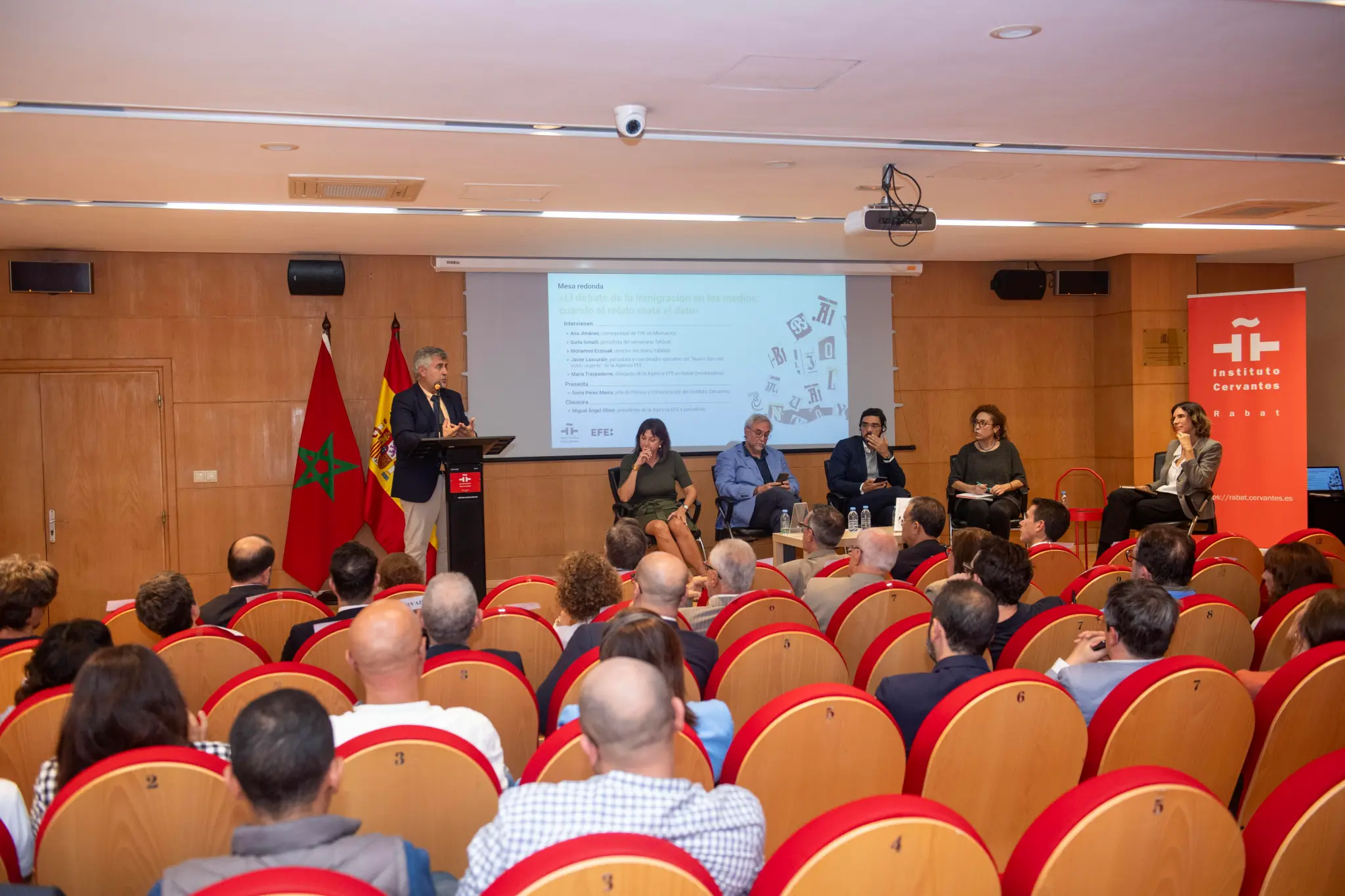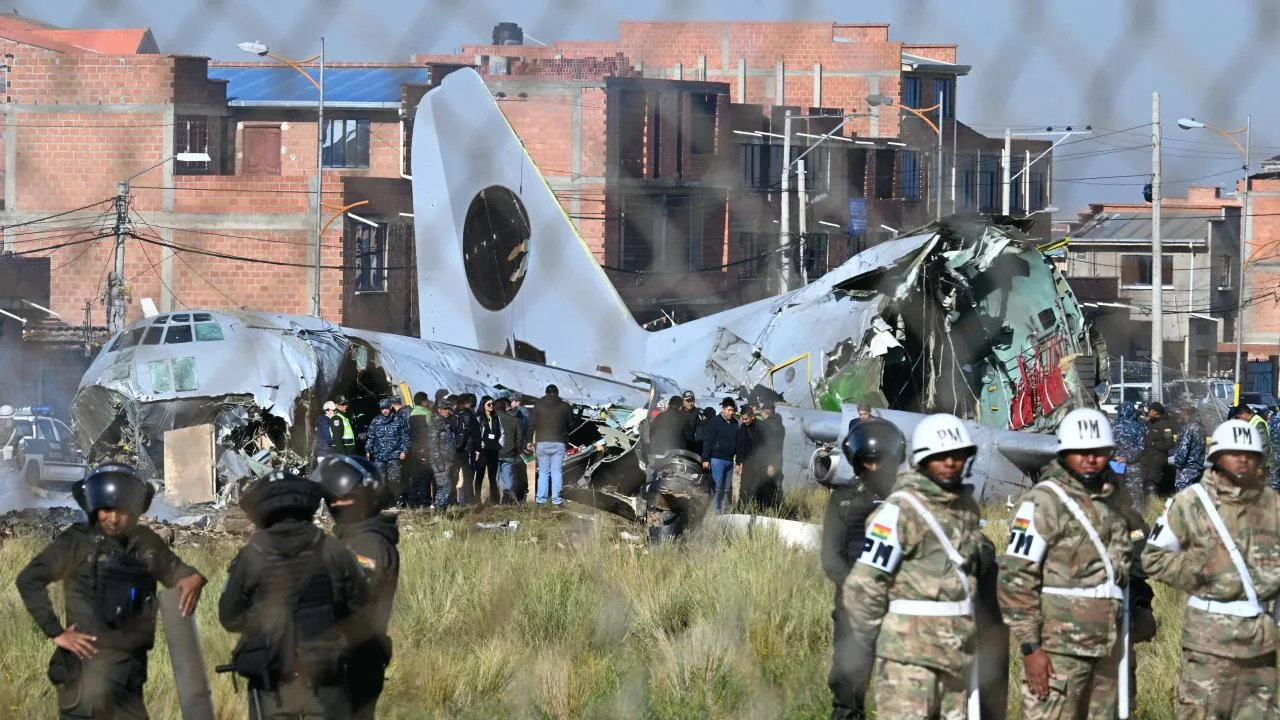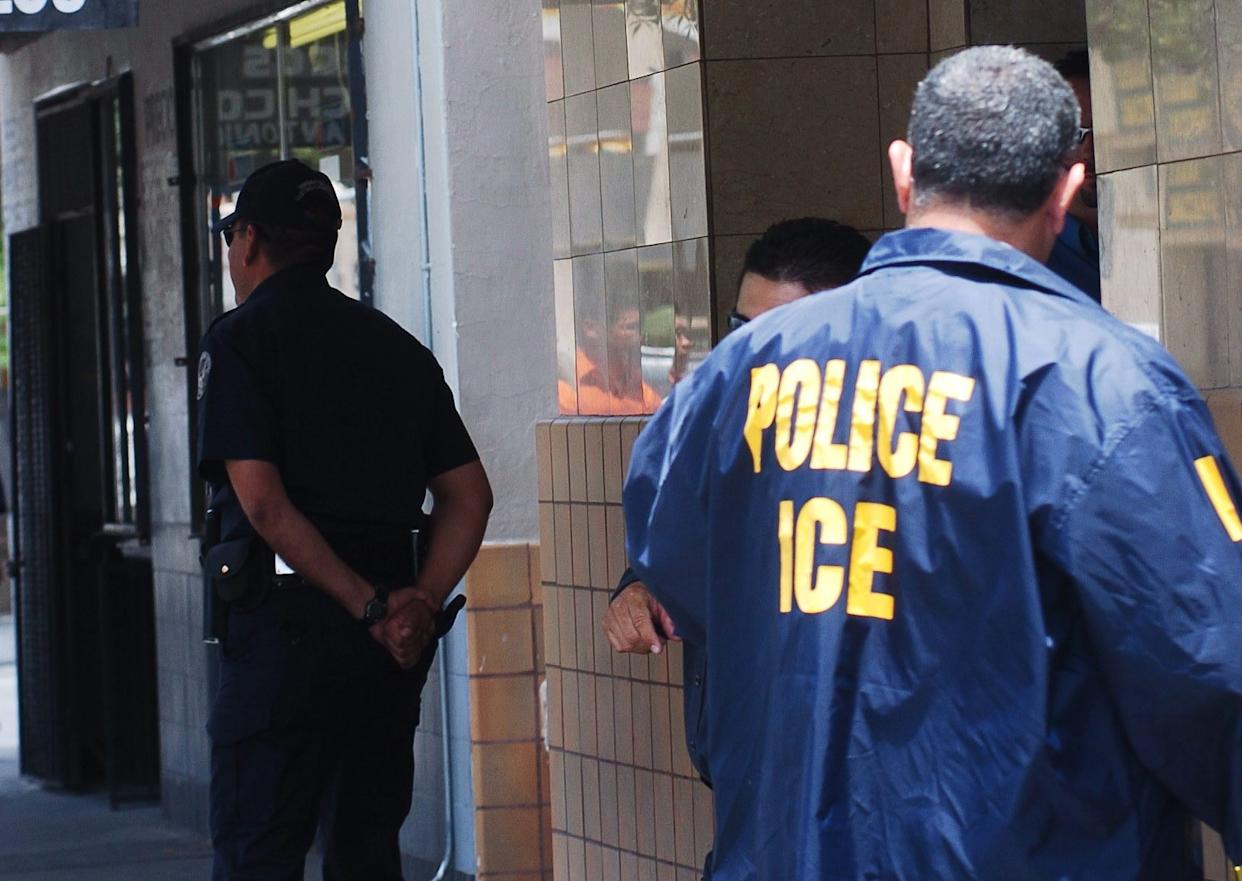International
Miguel Ángel Oliver: The EFE Agency is an antidote against racism

The president of the EFE Agency, Miguel Ángel Oliver, said on Tuesday that the EFE Agency is “an antidote against racism” during the presentation of the New Urgent Style Manual at the headquarters of the Cervantes Institute of Rabat.
“EFE, through the new book, is an antidote against racism. When immigrants are rejected for ethnic or social reasons, it is simply racism,” Oliver stressed when closing a round table entitled “The debate on immigration in the media: when the story kills the data.”
Oliver recalled that journalists have the duty to tell the stories of emigrants and to fight that hate speech against these people: “Put names to the drama, faces and voices,” he insisted.
He stressed that there are media that work against this hate speech. In this sense, he pointed out that media such as EFE and RTVE “are an example of responsible treatment of migration information.”
It is important to humanize the stories of migrants
On this issue, the Moroccan and Spanish journalists who participated in the round table agreed on the need to humanize the stories of migrants, give them a voice without entering into controversy, and avoid degrading language.
During the debate, the speakers stressed the need not to neglect the personal stories of each migrant, and not to limit themselves to providing figures of people who tried to cross into Europe.
“Journalists must be on the side of the marginalized who will never make it to the news. The journalist has to be critical of governments. Behind thousands of people crossing, you have to spend time telling the story of Pepe, Fátima…”, said Ana Jiménez, TVE correspondent in Morocco.
The Spanish journalist stressed that the data is forgotten but the personal stories or shocking images, such as that of Luna hugging the migrant Abdou, who went viral during the massive entry of emigrants into the Spanish city of Ceuta in May 2021, reach the consciousness of the viewers.
The EFE Agency’s manual to cover migration issues
One of the points on which the speakers insisted is that of the words used to cover migration issues or to refer to migrants.
Jiménez acknowledged that he learned, thanks to style books – such as EFE – or the work of NGOs to differentiate between “jump” and “assault”: the latter term is usually used in the media to refer to the attempt of migrants to jump the border fence of Ceuta or Melilla but it is a word that is associated with weapons, which migrants do not carry.
In the same sense, Mohamed Ezzouak, director of the Moroccan electronic newspaper ‘Yabiladi’ – which gives special importance to the issues of the Moroccan diaspora abroad – recognized that because of the words we sometimes “animalize” the migrant using degrading words.
Ezzouak recalled some episodes in the past in the Moroccan press where sub-Saharan migrants were labeled “black plague” or even “cockroaches.”
“But the Moroccan media criticized this coverage,” said the journalist, who stressed that these are isolated situations in which it does not reflect the temperament of a country, where there is no polemical debate about emigration, unlike countries like Spain or France.
The correct terms must be used
In the same sense, Ghita Ismaili, journalist of the Moroccan weekly in French ‘Telquel’, stressed the difference between Spain and France, where “emigration is a daily issue” and where there is a political debate animated by the right and extreme right, a point in which he has cited Vox.
“When we refer to emigration in the Moroccan media it is done differently, emigration is very factual, there are not many comments, and the news is more about rescues made by the country’s authorities and the Royal Navy,” he said.
Ismaili recalled that the last time there was debate and the news of migrants monopolized the front pages of the media was after the call for the mass crossing to Ceuta on September 15, which went viral on social networks and led about 3,000 people, mostly Moroccans, to try.
The new EFE Style Book, whose first edition was published in 2011, has a different structure, reviews and rewrites much of its material and incorporates a multitude of aspects that have appeared or gained importance in recent years in the newsrooms of EFE and all media, such as social networks or artificial intelligence.
The coordinator of the guide, Javier Lascuráin, explained during the round table that the work includes the ethical, professional and linguistic principles of the public agency and broke down some of the considerations that are included in the treatment of migration: avoid pejorative terms such as “avalanche” or “mena”, give voice to migrants, among others.
International
Bolivia Orders Three Investigations Into Deadly Military Plane Crash

Bolivia’s Defense Minister Marcelo Salinas announced Monday that three separate investigations will be conducted into Friday’s crash of a military cargo aircraft at El Alto International Airport, near La Paz, which left at least 22 people dead.
The Hercules aircraft, operated by the Fuerza Aérea Boliviana (FAB), was transporting cash intended for the Central Bank of Bolivia when it overshot the runway after landing from the city of Santa Cruz. The plane reportedly traveled nearly one kilometer beyond the airport perimeter.
The incident sparked chaotic scenes, with individuals attempting to collect scattered banknotes. Authorities detained 51 people in the aftermath, and the government declared three days of national mourning.
Multiple Investigations Underway
The first inquiry is being led by a military board from the Bolivian Air Force, which has already taken custody of the aircraft’s black box for analysis.
Minister Salinas said two additional investigations will follow — one conducted by the insurance company and another by the aircraft’s manufacturer.
“At least two more investigations will come, that of the insurance company and that of the aircraft manufacturer,” Salinas said during a press conference in Santa Cruz.
He cautioned that the investigative process could take between three and six months, noting that the black box cannot be opened in Bolivia due to the lack of specialized laboratories for analysis.
Awaiting Official Findings
Salinas stressed that the FAB investigative board is the highest authority in the case and urged the public to wait for its conclusions to avoid speculation about the causes of the crash.
He also confirmed that the government has contacted the families of the 22 victims and the 37 injured, as well as the owners of 15 damaged vehicles, to coordinate procedures with the insurer and cover the corresponding expenses.
International
Mexico Calls for Immediate Probe After National Dies in ICE Custody

Mexico’s Secretaría de Relaciones Exteriores (SRE) on Monday called on U.S. authorities to conduct an “immediate and thorough” investigation into the death of a Mexican national while in custody of U.S. Immigration and Customs Enforcement (ICE) at a processing facility in California.
In a statement, the Mexican government described the death as “regrettable” and urged U.S. officials to clarify the circumstances surrounding the case in order to “determine responsibilities and ensure that such events do not happen again.”
Death at Adelanto Processing Center
According to available information, the Mexican citizen died at the Adelanto Processing Center in California while under ICE custody. Authorities have not yet released the individual’s identity or the cause of death.
Following the incident, Mexico’s Foreign Ministry formally requested “detailed information” from U.S. authorities, including the detainee’s medical records and custody reports.
Consular Assistance Activated
The Mexican Consulate in San Bernardino, California, has activated consular assistance protocols to provide ongoing support to the deceased’s family. Officials have contacted relatives to express condolences and offer legal guidance, as well as assistance with the necessary procedures to repatriate the remains.
“The handling of situations like this and the establishment of mechanisms to resolve them are priorities for the Government of Mexico,” the Foreign Ministry said, adding that it will formally request an investigation into any systemic conditions that may have contributed to such incidents.
Local Mexican media reported that seven Mexican nationals died while in ICE detention last year — the highest number recorded since the agency was created.
International
Anti-ICE Billboard Campaign Targets Immigration Spending in 31 U.S. Cities

More than 200 billboards criticizing U.S. Immigration and Customs Enforcement (ICE) began appearing Monday in 31 cities across the United States, including Miami, as part of a campaign highlighting the high cost of immigration enforcement operations for taxpayers.
The initiative, titled “ICE Costs Us,” was launched by the civil rights organization Mijente and will run for four weeks.
Criticism of Spending and Enforcement Tactics
The billboards feature images of ICE agents during arrests or carrying military-style weapons. According to the organization, spending on military-grade equipment for the agency has increased by 600 percent in recent years.
Several signs display messages such as:
“Your taxes are being wasted” and “ICE’s cruelty costs you $28 billion,” referring to the agency’s annual budget.
In a statement, Marisa Franco, co-founder of the Mijente Support Committee, said:
“For too long, our government has prioritized building cages and investing billions in an immigration enforcement apparatus that has left families torn apart and communities terrified.”
She added that “Millions of Americans are living paycheck to paycheck, yet this violent agency continues operating with a blank check. These decisions do not make us safer nor improve our economic security. Our billboards highlight these choices and demand a different path.”
Budget Debate and Medicaid Comparison
The campaign also draws a comparison between ICE’s funding and the estimated 17 million people who could lose health coverage under Medicaid due to federal budget cuts under President Donald Trump.
Other billboard messages seen in various cities include:
“They get billions to beat us; we get layoffs and rising rents” and “Funding ICE is a fast track to fascism.”
Organizers say the goal is to spark public debate about the allocation of federal funds for immigration enforcement and the broader economic and social impact of such policies on communities nationwide.
-

 International4 days ago
International4 days agoCocaine Production Surges 34% in 2023 as Market Expands into Africa and Asia
-

 International3 days ago
International3 days agoTrump Floats “Friendly Takeover” of Cuba Amid Rising Tensions
-

 International1 day ago
International1 day agoIran Reports 201 Dead, 747 Injured After U.S. and Israeli Strikes
-

 International4 days ago
International4 days agoFederal Judge Blocks Trump Policy Allowing Deportations to Third Countries
-

 International3 days ago
International3 days agoArgentina’s Senate Reviews Milei-Backed Labor Overhaul
-

 International2 days ago
International2 days agoSecurity Council to Hold Emergency Meeting on Middle East Crisis
-

 International1 day ago
International1 day agoPope Leo XIV Urges End to ‘Spiral of Violence’ in Middle East
-

 Sin categoría2 days ago
Sin categoría2 days agoTrump: ‘We Think It’s True’ Amid Claims Iran’s Supreme Leader Was Killed
-

 International4 days ago
International4 days agoClinton Accuses Republican Committee of Using Epstein Case to Shield Trump
-

 International12 minutes ago
International12 minutes agoTrump Warns of ‘Major Wave’ of Attacks as Iran Conflict Escalates
-

 International18 minutes ago
International18 minutes agoBrazil’s Supreme Court Rejects Bolsonaro’s Bid for House Arrest
-

 International8 minutes ago
International8 minutes agoAnti-ICE Billboard Campaign Targets Immigration Spending in 31 U.S. Cities
-

 International6 minutes ago
International6 minutes agoMexico Calls for Immediate Probe After National Dies in ICE Custody
-

 Central America4 minutes ago
Central America4 minutes agoPanama Canal Monitoring Trade as Middle East Conflict Disrupts Shipping
-

 International14 seconds ago
International14 seconds agoBolivia Orders Three Investigations Into Deadly Military Plane Crash




























